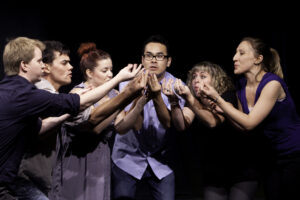If you ask most people to play word-association with the term “acting,” they’ll usually respond pretty quickly with the word “scripts.” Indeed, for the layman the two seem to go hand in hand. Obviously, most acted content, whether on-camera, theater, or voiceover is in fact scripted. After all, we’d be fairly lost without a story, right? However, what is often unnoticed by the average viewer, theatergoer, or listener, is just how many elements of a performance are driven by good improvisation skills.
The improv techniques actors bring to bear in their performances are often lost on the public because they seem so natural. A pause, as though in thought. A sigh, a chuckle, a conversational “well” or “but” added before a scripted line. Even a stammer or a stutter can be an extemporaneous improvisation that transforms an otherwise mechanical performance into something authentic and relatable. When done with skill and cleverness, improv is invisible.
Broadway producer and actor Rob Schiffmann has said that in improv, “The key is to use something that is a mystery to you, and then follow it. And let it reveal itself without too much concern for solving that mystery.” Robin Williams, perhaps the most skilled improv actor showbiz has seen, said, “You’re only given one little spark of madness. You mustn’t lose it.”
The question, of course, is where does one refine that little spark of madness?
Improv skills come naturally to many, but very few actors can improvise on an elite level without exercising their abilities in an environment designed to train and grow them. To many, the first name that comes to mind when we think of improv is The Groundlings.
The Groundlings are an LA-based improv and sketch comedy organization, and have been home to many legendary performers including Will Ferrell, Kathy Griffin, Phil Hartman, Lisa Kudrow, Phil LaMarr, Conan O’Brian, and Tyra Banks, among countless others.
With more than 2,000 students per year passing through their competitive, audition-based program, having The Groundlings on your resume as an actor is instant credibility in the eyes of many casting directors both for on-camera talent and voice actors.
Yet, other options exist as well. Well-known commercial actor, voice actor, and sought-after improv coach Scott Parkin has this to say about improv in general. “Improvisation is one of the most important tools in ANY actor’s toolbox because it supports, shapes, and can define an honest performance. As a voice actor defining and maintaining your character from start to finish is an important way to compete and stand out, and improvisation is the key to character definition and development.”
Scott continues, “On stage improv is a different animal but offers the easiest access to improv training. In voice over, generally speaking, the window to improvise on your audition is much narrower than on stage, but the skill sets are grounded in the same techniques. I would say find a fun local group in your own town …you don’t need The Groundlings or UCB to learn the basics.”
For actors of all stripes, it’s clear that being able to understand the principles of improv can be key to getting traction in the industry. Even if their skills are so strong that the audience never notices that they are improvising at all.



Leave a Reply